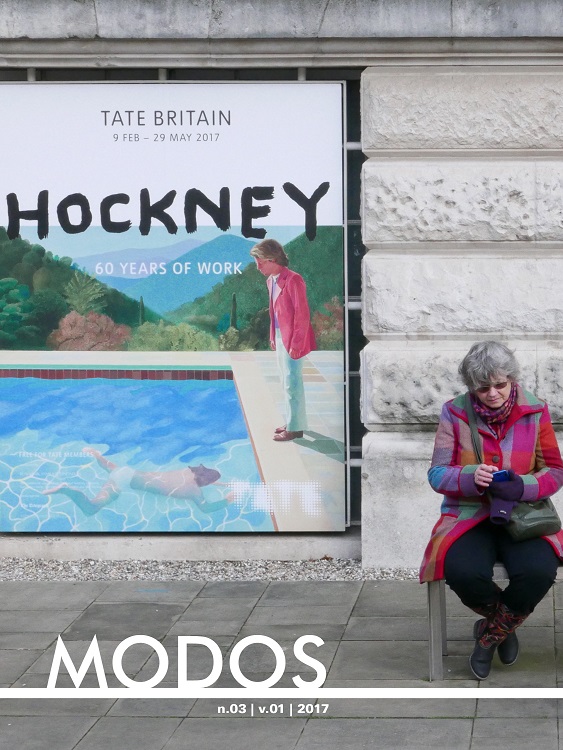Abstract
This paper describes the 1970s as the period of the latest artistic vanguard and the first manifestations of post vanguard art. Referring to culture critics Peter Burger, Fredric Jameson and Andreas Huyssen, it specifies changes in the artistic imagery in this decade. It shows that for Burger, although the political intentions of the vanguard have not survived, this decade’s artistic legacy cannot be ignored, for these manifestations would have placed a plurality of means, techniques and procedures at the disposal of post vanguard artists. It also highlights the characterization of the postmodern art by Jameson as a combination of absurd signs gratuitously collected from the past, thus paradoxically resulting in historical amnesia. Finally, the paper shows that Huyssen considers this gaze turning, from the future to the past, as progressive, that is, as the historical consciousness that allowed to recover the continuum in time after the successive ruptures with the artistic tradition decreed by the vanguards. It is in art as singular accomplishments that several artists, working from the end of the 1970s on the ruins of modernism - stressing aesthetics and politics in structured artistic forms - meet both the needs of politics and aesthetics. The 1970s showed, as the article concludes, that politics has been produced since the end of the vanguards by the artist’s non-programmatic aesthetics.
References
ADORNO, Theodor. Teoria estética. São Paulo: Martins Fontes, 1982.
AGAMBEN, Giorgio. O que é o contemporâneo? e outros ensaios. Chapecó (SC): Argos, 2009.
BOURRIAUD, Nicolas. Pós-produção: como a arte reprograma o mundo contemporâneo. São Paulo: Martins Fontes, 2009.
__________, Estética relacional. São Paulo: Martins Fontes, 2009a.
__________, Radicante: por uma estética da globalização. São Paulo:Martins Fontes, 2011.
BÜRGER, Peter. Teoria da vanguarda. São Paulo: Cosac Naify, 2008.
DEBORD, Guy. A sociedade do espetáculo. Rio de Janeiro: Contraponto, 1997.
DELEUZE, Gilles & GUATTARI, Félix. O anti-Édipo: capitalismo e esquizofrenia. São Paulo: Editora 34, 2010.
DIDI-HUBERMAN, Georges. Diante do tempo: História da arte e anacronismo das imagens. São Paulo: Editora UFMG, 2015.
FABBRINI, Ricardo Nascimento. A arte depois das vanguardas. Campinas: Editora da Unicamp, 2002.
FAVARETTO, Celso Fernando, Arte e cultura nos anos 60: resistência e criação. In: SANTOS, Juana E. (org.). Criatividade, Âmago das diversidades Culturais: A Estética do Sagrado. Salvador, SECNEB, 2010.
__________, S/T. In: Arte em Revista, CEAC: Centro de Estudos de Arte Contemporânea, ano 5, n.7, ago. 1983.
FOSTER, Hal. Recodificação: Arte, espetáculo, política cultural. São Paulo: Casa Editorial Paulista, 1996.
FREITAS, Artur, Arte de Guerrilha: Vanguarda e Conceitualismo no Brasil. São Paulo: Edusp, 2013.
GREENBERG, Clement. Arte e cultura: ensaios críticos. São Paulo: Ática, 1996.
HEGEL, G.W.F. Cursos de Estética I. São Paulo: Editora da Universidade de São Paulo, 1999.
HABERMAS, Jurgen. Arquitetura moderna e pós-moderna. In Novos estudos CEBRAP. No. 18. São Paulo. set. 1987.
HUYSSEN, Andreas. Mapeando o pós-moderno. In: DE HOLANDA, Heloisa Buarque (org.). Pós-modernismo e Política. Rio de Janeiro: Rocco, 1991.
_______, Culturas do passado-presente: modernismos, artes visuais, políticas da memória. Rio de Janeiro: Contraponto, Museu de Arte do Rio (MAR), 2014.
JAMESON, Fredric. Pós-modernidade e sociedade de consumo. In Novos Estudos CEBRAP. São Paulo: CEBRAP, no. 12, jun. 1985.
_________, Periodizando os anos 70. In DE HOLANDA, Heloisa Buarque (org.). Pós-modernismo e política. Rio de Janeiro: Rocco, 1991.
_________, A Cultura do dinheiro: ensaios sobre a globalização. Petrópolis: Vozes, 1991a.
_________, A virada cultural: reflexões sobre o pós-moderno. Petrópolis: Vozes, 2001.
KANT, Immanuel. Crítica da faculdade do juízo. Rio de Janeiro: Forense Universitária, 1993.
KOSSOVITCH, Leon. Rancière e a Labor. In. Textura: Revista de Psicanálise, no. 5. São Paulo Publicações Reuniões Psicanalíticas, 2005.
LYOTARD, Jean-François. O Pós-Moderno. Rio de Janeiro: José Olympio, 1986.
MORAIS, Frederico. Artes Plásticas: A Crise da Hora Atual. Rio de Janeiro: Paz e Terra, 1995.
OLIVA, Bonito Achille. La trans-vanguardia. Buenos Aires: Rosemberg-Rita, 1982.
ROLNIK, Suely, & DISERENS, Corinne. Lygia Clark, da obra ao acontecimento: Somos o molde. A você cabe o sopro. São Paulo: Musée des Beaux-Arts de Nantes/ Pinacoteca do Estado de São Paulo, 2004.

This work is licensed under a Creative Commons Attribution-NonCommercial-ShareAlike 4.0 International License.
Copyright (c) 2018 MODOS

